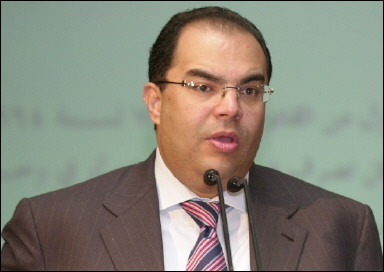 I am in no way opposed to exposing corruption or reforming whatever aftermath it may bring. But I am opposed to trifling with the stability of the community or jeopardising economic development. Given the slow and stumbling political reform, economic reform remains our only chance to rescue the needy and underprivileged, and give them hope for a better tomorrow.
I am in no way opposed to exposing corruption or reforming whatever aftermath it may bring. But I am opposed to trifling with the stability of the community or jeopardising economic development. Given the slow and stumbling political reform, economic reform remains our only chance to rescue the needy and underprivileged, and give them hope for a better tomorrow.
Tremors in the investment market
Youseef Sidhom
Opinion
00:10
Sunday ,03 October 2010

No matter how much we respect court rulings, it must be owned that the recent ruling annulling the contract of Madianty housing project had the effect of a bombshell that blew up the stability of the market for real estate investment. Many investors warily held their breath, fearing the same fate awaited their investment.
Thousands of investors have, over the last few years, submitted to the New Urban Communities Authority (NUCA) proposals for projects, and were allocated lands on which to establish these projects once they were approved. There was no intention whatsoever of bypassing the law; these investors believed their papers and projects were totally legal. They began construction work which, according to their contracts with NUCA, had to be completed against a specific deadline, in order to guarantee the land allocated would be used for the benefit of the country and not traded for profit. The projects flourished, investments poured into the real estate market, and thousands upon thousands of employment opportunities were created. Only last month, however, these investors woke up to the rude shock that the land allocation was illegal; the land should have legally been put up for auction. After Madinaty, would it be their turn next?
Since the case was primarily concerned with the land allocation policy of the NUCA, it would have made sense that the ruling would have applied to that apparatus. Any retribution should have been paid by the NUCA, and revised policies should have been applied in the future. But, as it is, we find ourselves before two predicaments.
The first predicament is that the current legislation governing land allocation is indeed conflicting. Moufid Shehab, Minister of State for Legal and Parliamentary Affairs commented on the Madinaty ruling by saying that new legislation ought to be made to resolve the conflict. In general, existing legislation stipulates that State-owned land can only be sold through auction, while legislation governing the special cases of land in new urban communities or tourist development areas may be sold by directly order or allocation. Dr Shehab’s words appear to imply that the allocation of land for Madinaty violated no law, and that the law itself was meant to encourage and motivate investors.
It is only fair to indicate that Madinaty as we know it today, a project which offers excellent opportunities to home buyers and job seekers alike, has not been always what it is. It started off a lone plot of vast, unattractive desert land, deprived of urban planning, roads, services, utilities or facilities. Today it has become an urban community centre to which thousands have flocked to buy new homes, attracted by the success of a previous project, al-Rehab town east of Cairo by the same investor. Rehab is a landmark of integrated urban development for the middle class, at a time when almost all investors cater to the wealthy classes.
Critics now talk of the huge profits made by the Madinaty investor, conveniently forgetting the gigantic investment poured to make the project a reality or the thousands of jobs created in the process. They forget the price and hazards of venturing into the unknown, and focus on the luscious fruit now ripe for picking as though it is undeserved.
Our recent history is full of projects which would have remained no more than harsh desert land had investors not been granted facilities and incentives to turn them to the prosperous venues they are today.
The second predicament in the Madinaty case is that the Madinaty project was penalised. The land allocation was pronounced null and void; the project itself—no matter that a huge portion of it has already been achieved—null; the investor, worker, and buyer interests thrown to the wind. How can this represent justice, equal opportunity, and State interest? For its part, the NUCA, in an attempt to tackle the aftermath of the ruling, declared its intention to resell the land of Madinaty to the same investor by ‘direct order’ basing on the need to achieve social and economic benefits in the interest of the public.
The blow to Madinaty is not the first or the only of its kind. I just hope those in charge of the investment market in Egypt would take good note of the repercussions of how the market is shaken every once in a while.



